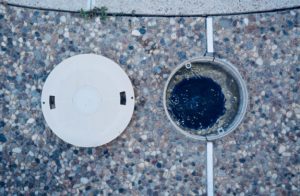Schedule Service
Inground Pool Repairs – What are Some of the Most Common Pool Repairs?
Category: Blog
September 11, 2018We all love our swimming pools and repairs are just part of pool ownership. As you can imagine, leaking air and water—whether from a pipe or pump—cause most of the problems for inground pools (Church Pool Services doesn’t work on above-ground pools).
Whenever you hear leaking air or see water coming out of something that it shouldn’t, fix it quickly or call someone fast because the issue is going to get worse and could cost you a lot more money if you ignore it.
Here are a few of the most common pool repairs we encounter in Houston swimming pools:
Leaky Pool Pumps
There are two kinds of pool pumps: those that leak and those that are going to leak. Considering the immense pressure that your pool pump operates under, a leak can come from a worn pump lid, the drain plug or the pipes pushing water out of the pump.
With the sun beating down plus the tremendous pressure and the number of strong chemicals flowing through the system, the equipment can break down faster and form cracks. If you see water leaking down the bottom of the seal plate, it could mean a blown shaft seal.
Dirty Filters
A dirty filter is one of the easiest issues to diagnose because your pool looks swampy even though you’re backwashing it more often. At best, you just need to clean your filter. At worse, depending upon your filter, you may need to escalate the remedy:
to clean your filter. At worse, depending upon your filter, you may need to escalate the remedy:
- Cartridge Filters. These last only about 7 years, but they’re the easiest to replace when the time comes.
- Diatomaceous Earth or DE. The good news is that DE filters last about 10 years. The bad news is the grid may be broken letting debris pass through and it may need to be replaced.
- Sand Filter. Sand lasts about 7 years – on a well-sized pool filter.
Clogged Pump
Clogs are worse in the spring when plants start blossoming and shedding seeds and other small debris like dog hair and pine needles fall into your swimming pool. This material can gather in the impeller vanes if the pump basket has holes or if it’s installed improperly.
You’ll know when your pump impeller may be clogged if:
- Pump pressure drops
- Water flow falls
- The basket may not be full, but the motor runs at a higher pitch than normal
Skimmer Leaks
If you suspect a leak in your pool, always check the skimmer first. On concrete pools, the skimmer can separate itself from the structure. On vinyl pools, skimmer leaks can be caused by a worn-out, poorly installed or faulty skimmer gasket. Freezing temperatures can cause cracks and damage the skimmer. Typically, these issues can be fixed fairly easily unless you let them go and they can quickly become a major repair job.
Leaky Pool Filter
Leaks in your pool filter tank need immediate attention since this produces the most pressure. If you have an older tank, whether it’s stainless steel or plastic, that has a pinhole leak, shut it down immediately and replace it as soon as you can. If you see that the belly band o-ring is leaking, shut off the system and try cleaning and re-sealing it. The most common leaks spring up around the air bleeder assembly, drain plugs or drain caps which all can be repaired pretty easily as long as they’re not broken or missing a part.
Melted Pump Fitting
If your pump runs dry, it can generate so much heat that the threads can melt, shrink and cause it to leak. Unfortunately, this is a pressure leak issue so you can’t solve it with Teflon tape or pool putty. The only way to fix it is to cut it out and replace it with a heat-resistant fitting to prevent the problem for repeating in the future.
Air in Pump Basket
Air has so many ways to get sucked into your pump whether it comes through a poorly sealed pump lid or an o-ring that’s dirty or just loose. Your pump can pull air in if the suction side before the impeller is leaky. Sometimes cleaning the o-ring with some Teflon lube and just tightening down the lid does the trick. Sometimes it can get more serious when air comes through the threading on the fitting at the front of the pump making it run dry. As we talked about above, if air gets through, your pump could overheat and melt the pump fitting and shrink the threads. Now you have to replace the fitting.
As a pool owner, you’ve come to discover that “it’s always something.” But all of these problems can be fixed. In the big scheme of things, nothing in your home brings friends and family together like your swimming pool. In the meantime, if something on your swimming pool or spa stops working and you have no idea what to do, call the experts at Church Pool Services for help.

